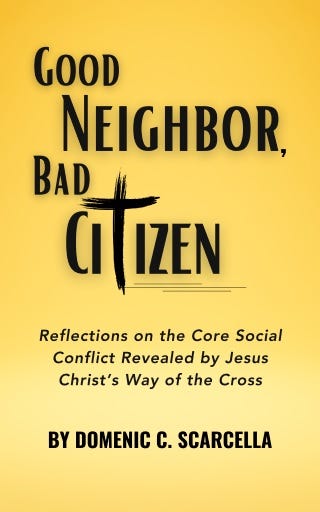Married, Ordained, Consecrated, ... Single?
The Call to Be a Good Neighbor Is a Meta-Vocation That Supports Our Social-Priority Vocation (Or Lack Thereof)
I spoke on a panel this past weekend for local Boy Scouts looking to complete their Religious Emblem. The event centered on what Christians (and other traditions, I imagine) refer to as a vocation in life, and we panelists fielded questions from the teens in attendance.
The panel featured a clergyman, three consecrated women from a local religious community, a married couple … and a single guy (me).
What was I doing there? Is “single” really a vocation in the category of the others?
The Participation Trophy
In some ways, I had the most difficult job of the panelists.
A vocation is a calling. More specifically for married, consecrated, and ordained life, it implies movement toward a social relationship/identity that takes priority over all others. To distinguish from other pop-culture uses of the term, I’ll refer to this kind of vocation/calling as a “social-priority vocation.”
For married people, this reality should be obvious. A husband and wife make each other their most important social commitment. They get new identities (“husband” and “wife”) that affect all their other relationships.
Social-priority vocation is also obvious for those in consecrated life, especially if in a devotional community (think nuns and sisters for women, monks and brothers for men). Their consecrated community becomes their most important social connection, complete with a new identity that affects all their other relationships.
Same for a member of the ordained clergy: new social priority of active ministry, and new identity with ripple effects through their social circles.
Which brings us to the problem with lumping “single” into that category. Singlehood is defined by its lack of a social-priority relationship and lack of an additional identity, and grouping it with the others seems like bestowing a Participation Trophy: a shallow attempt at nominal inclusion.
Really, “single” is the factory setting for human beings. Even if you believe that God predestines each person’s vocation, we still don’t realize it in our limited, linear lives until it finally happens for us. We’re all single, until we’re not.
The Meta-Vocation: Good Neighbor
But in other ways, I had the easiest job.
Because … We’re all single! (until we’re not)
This means I could talk about the maturity and character development we’re all supposed to pursue, as we’re all called by Jesus Christ to the meta-vocation of Good Neighbor (and probably also Bad Citizen, but I digress).
In Christianity, Baptism is the first sacrament received, indicating a faith that is both personal and meant to be shared. I encouraged the teens to remember their Baptismal promises:
1. Sacrificing for others (“priest” in the general sense, different from the specific ordained-clergy sense)
2. Witnessing for God in the world (“prophet”)
3. Discovering the power of serving others as peers, instead of lording over others and flaunting social status (“king/queen” in the mode of Jesus’ hierarchy-flattening, nonviolent Servant King)
Those are all expressions of good neighborliness, and that third one is especially anarchist!
Don’t hide — seek instead!
We’ve likely all observed — or participated in — social-priority vocations gone awry: marriages, consecrations, and ordinations that failed due to people using the vocation to hide from unresolved past experiences and lingering vices.
Answering a calling is supposed to be about seeking, not hiding!
I encouraged each Scout to take the opportunity while still single to develop his character and practice his Baptismal promises. We each owe it to our future spouses, religious communities, or congregations to be responsibly oriented and equipped for the commitment.
Best-case scenario: Your maturation and good neighborliness increase your chances of finding and succeeding at your social-priority vocation.
Worst case scenario: You never have a social-priority vocation and simply live as a single, well-adjusted, well-grounded, self-motivated, resilient, successfully content, good neighbor.
“Single” may not be a vocation like the others, but it can still be a Christ-aligned way of living.
You are ‘called’ … to share your thoughts!
What do you think of the journey we embark upon to discover and then commit to our social-priority vocations? What are the most challenging and most rewarding parts of that endeavor for you?
Does “single” fit with that category of vocations? Why or why not?
We’re all single, until we’re not … how valuable do you consider the opportunities to better ourselves before finding our social-priority vocation?
Join the “panel of presenters” in the Comments section, and share your thoughts on these questions and any other things that stood out to you about this post!





